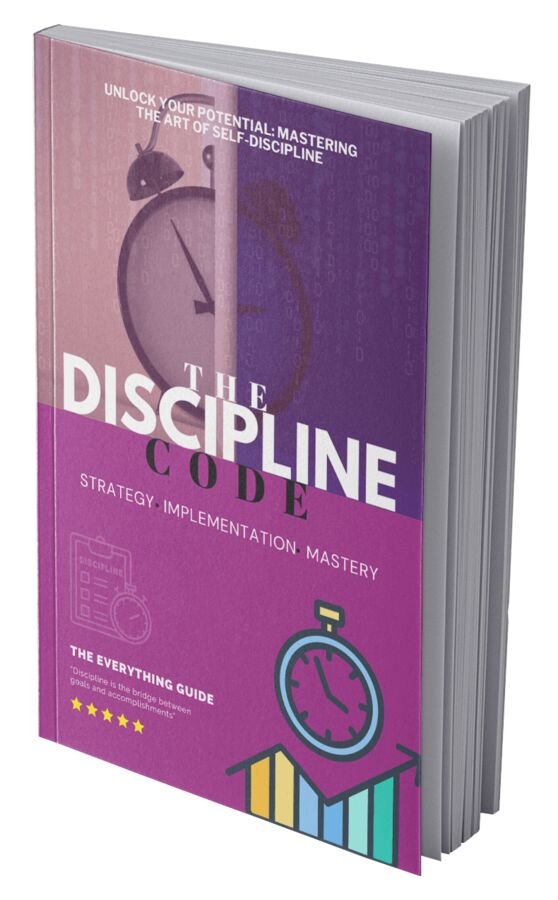
Mastering Financial Discipline: Essential Strategies for a Secure Future
Introduction to Financial Discipline
Financial discipline is the cornerstone of achieving long-term financial stability and security. It involves a systematic approach to managing income, expenses, savings, and investments with a focus on adhering to a well-defined financial plan. This disciplined approach is essential for both short-term financial health and the realization of more significant, long-term financial goals.
One of the primary benefits of financial discipline is the reduction of stress. Knowing that you have a structured plan in place to manage your finances can alleviate the anxiety associated with financial uncertainty. This sense of control allows individuals to face unexpected expenses without derailing their overall financial strategy. Whether it’s an unforeseen medical bill or a sudden home repair, being financially disciplined ensures that such surprises can be handled with minimal disruption.
Moreover, financial discipline fosters the potential for wealth accumulation over time. By consistently saving and investing, individuals can build a robust financial portfolio. This habit of disciplined saving and investment can lead to significant wealth growth, enabling financial independence and the ability to achieve long-term goals such as home ownership, retirement, or funding higher education for children.
Another critical aspect of financial discipline is the development of good financial habits. These habits, such as budgeting, regular savings, and prudent spending, form the foundation of financial success. By cultivating these habits, individuals can avoid common financial pitfalls such as debt accumulation and poor investment choices. Instead, they can focus on practices that contribute to financial well-being and security.
In summary, financial discipline is not merely about restricting spending but rather about making informed, strategic decisions that align with one’s financial goals. The benefits of being financially disciplined are manifold, including reduced stress, the ability to handle unexpected expenses, and the potential for significant wealth accumulation. By embracing financial discipline, individuals can set themselves on a path toward a secure and prosperous financial future.

Setting Clear Financial Goals
Establishing clear and achievable financial goals is a fundamental step in mastering financial discipline. These goals provide a roadmap that helps guide your financial decisions, keeping you focused and motivated throughout your financial journey. To set effective financial goals, it is essential to differentiate between short-term and long-term objectives and to develop a structured plan to achieve them.
Short-term financial goals are those that you aim to achieve within a year. These can include building an emergency fund, paying off high-interest credit card debt, or saving for a vacation. To define short-term goals, evaluate your current financial situation, identify immediate financial needs, and set specific, measurable targets. For instance, instead of simply aiming to “save money,” set a goal to save $500 in three months by cutting discretionary spending and automating transfers to a savings account.
Long-term financial goals, on the other hand, usually span several years or even decades. These goals can include purchasing a home, funding your children’s education, or planning for retirement. To establish long-term financial objectives, consider your life aspirations, evaluate potential future expenses, and set realistic timelines. For example, if you plan to retire in 20 years, determine how much you need to save annually to reach your desired retirement fund, factoring in potential investment growth and inflation.
The process of setting clear financial goals involves several key practices: specificity, measurability, attainability, relevance, and time-bound (SMART) criteria. Specific goals eliminate ambiguity, making it easier to track progress. Measurable goals allow you to quantify your achievements. Attainable goals ensure that your objectives are realistic given your financial situation. Relevant goals align with your broader life objectives, and time-bound goals provide a clear deadline for achievement.
By having specific financial goals, you create a sense of purpose and direction in your financial journey. These goals act as a motivational tool, encouraging you to maintain financial discipline and develop healthy financial habits. Regularly reviewing and adjusting your goals as your circumstances change ensures that you stay on track and continue working towards financial success.
Creating and Sticking to a Budget
Creating a realistic and effective budget is a cornerstone of financial discipline. The process begins by assessing your current financial situation, which includes tracking all sources of income and meticulously recording expenses. By understanding where your money comes from and where it goes, you can gain a clearer picture of your financial habits and make informed decisions.
Start by listing all sources of income including salary, freelance work, or investment returns. Next, categorize your expenses into essential and non-essential categories. Essential expenses typically include housing, utilities, groceries, and transportation, while non-essential expenses encompass dining out, entertainment, and hobbies. This categorization helps in identifying areas where costs can be cut.
Tracking your spending can be facilitated through various tools such as spreadsheets, budgeting apps, or financial software. These tools provide visual representations of your spending patterns, making it easier to spot trends and potential areas for adjustment. It is essential to regularly review your budget to ensure it remains aligned with your financial goals. Adjustments may be necessary as your financial situation evolves, such as changes in income or unexpected expenses.
Setting realistic limits for each category of spending is crucial. Allocate a portion of your income towards savings and investments to build a secure future. Practicing financial discipline involves sticking to these limits and avoiding impulse purchases. Regularly reviewing your budget will help you stay on track and make necessary adjustments to better align with your financial objectives.
Moreover, being disciplined about your budget requires motivation and consistency. Developing good financial habits, such as regularly saving and minimizing unnecessary expenses, can significantly contribute to your long-term financial success. By integrating these practices into your daily life, you can create a sustainable strategy for managing your finances, ultimately leading to a more secure and prosperous future.

Building an Emergency Fund
An emergency fund is a financial safety net designed to cover unexpected expenses that may arise due to unforeseen circumstances. This fund is a vital component of financial stability, providing a cushion that shields you from the financial strain of emergencies. The essence of an emergency fund lies in its ability to offer peace of mind, knowing you are prepared for life’s uncertainties without jeopardizing your long-term financial goals.
Experts recommend that your emergency fund should cover at least three to six months of living expenses. This amount should be sufficient to manage basic necessities such as housing, utilities, food, and healthcare. To determine your individual needs, calculate your monthly expenses and multiply that by the number of months you want to cover. For instance, if your monthly expenses total $3,000, aim to save between $9,000 and $18,000.
Building an emergency fund requires a disciplined approach and strategic planning. Start by setting a realistic savings goal and timeline. Break down your target amount into manageable monthly contributions. For example, if you aim to save $12,000 in two years, you would need to set aside $500 each month. Automating your savings can help maintain consistency, directing a fixed portion of your income into a separate, easily accessible savings account. Additionally, consider cutting non-essential expenses and reallocating those funds to your emergency fund.
An emergency fund is meant to cover a variety of unexpected expenses, such as medical emergencies, urgent home repairs, car breakdowns, or sudden job loss. By having this financial buffer, you can avoid the need to rely on high-interest loans or credit cards, thereby reducing financial stress and preserving your long-term financial health.
Ultimately, the peace of mind offered by a well-funded emergency reserve cannot be overstated. It allows you to navigate financial setbacks with confidence, knowing you have a plan in place. By prioritizing the establishment and maintenance of an emergency fund, you lay a solid foundation for a secure financial future. (Expense Tracker Planner: Monthly Budget Planner, Finance Planner, Account Book to take Control of your Money, Expense Tracker Notebook, Budget reviews, financial goals, Bill Organizer, hold up to 2-Years of Expense, (6″x 9″), Click the Link to Get Your Copy Today: https://amzn.to/4fppcL3)
Managing Debt Wisely
Effective debt management is pivotal to achieving financial discipline and securing a stable future. Understanding the distinction between good and bad debt is the first step in this journey. Good debt is typically considered an investment that will grow in value or generate long-term income. Examples include mortgages, student loans, and business loans. Conversely, bad debt is often incurred for items that quickly lose value and do not contribute to long-term financial security, such as high-interest credit card debt or personal loans used for discretionary spending.
Creating a comprehensive debt repayment plan is crucial for managing debt wisely. Start by listing all debts, including the principal amounts, interest rates, and minimum monthly payments. This detailed inventory allows you to prioritize high-interest debts, which should be tackled first to minimize the overall interest paid overtime. Employing the debt avalanche method, where you focus on paying off the debt with the highest interest rate while making minimum payments on others, can be particularly effective. Alternatively, the debt snowball method—paying off the smallest debts first to build momentum—might be more motivating for some individuals.

Maintaining a healthy level of debt is not only about repayment but also about strategic borrowing. Responsible borrowing can positively affect your credit score, which is a critical component of your overall financial health. A good credit score can lead to lower interest rates on future loans and credit cards, further reducing your financial burden. Regularly monitoring your credit report and keeping credit utilization below 30% are best practices for sustaining a favorable credit score.
Incorporating these strategies into your financial discipline framework will not only help you manage existing debt but also prevent the accumulation of unnecessary debt in the future. The discipline and habits formed through effective debt management contribute significantly to long-term financial success and stability.
Saving and Investing for the Future
Achieving financial discipline involves a dual approach of saving and investing. Both components are integral to a robust financial strategy aimed at securing a stable future. Saving is the initial step, laying the groundwork for financial security. Common saving options include traditional savings accounts, high-yield savings accounts, and retirement accounts such as 401(k) plans and IRAs. Each of these accounts offers varying levels of accessibility and interest rates, but all serve the fundamental purpose of preserving capital and providing liquidity for unforeseen circumstances.
Investing, on the other hand, aims to grow wealth over time. Investment vehicles include stocks, bonds, mutual funds, and exchange-traded funds (ETFs). Stocks represent ownership in a company, offering potentially high returns but also higher risk. Bonds are essentially loans to governments or corporations, providing predictable interest payments and lower risk. Mutual funds pool resources from multiple investors to purchase a diversified portfolio of stocks and bonds, managed by professional fund managers. ETFs function similarly to mutual funds but trade on stock exchanges, offering liquidity and flexibility.

One of the key concepts in both saving and investing is compound interest, which Einstein famously called the “eighth wonder of the world.” Compound interest means earning interest on both the initial principal and the accumulated interest from previous periods. This exponential growth can significantly boost savings and investment returns over time, underscoring the importance of starting early. The sooner you begin saving and investing, the more you can benefit from the power of compounding.
Adopting disciplined financial habits, such as regular contributions to savings and investment accounts, can pave the way for long-term success. By understanding your options and implementing a balanced strategy, you can navigate the journey towards financial security with confidence. Establishing a routine of saving and investing not only safeguards your financial future but also instills a sense of discipline and control over your financial well-being.
(Additional eBooks are Available in the Freedom Funds Hub Shop)
Practicing Mindful Spending
Mindful spending is a crucial strategy in maintaining financial discipline and securing a stable future. At its core, this practice involves being fully aware of your financial decisions and ensuring that your spending aligns with your long-term financial goals. By distinguishing between wants and needs, you can better manage your resources and avoid unnecessary expenditures.
One of the fundamental aspects of mindful spending is understanding the difference between essential and non-essential purchases. Needs are items or services that are necessary for basic living, such as food, housing, transportation, and healthcare. Wants, on the other hand, are those things that enhance our lifestyle but are not crucial for survival. By prioritizing needs over wants, you can allocate your funds more effectively and avoid financial strain.
Impulsive buying is another significant challenge to mindful spending. To counteract this, it’s important to develop self-control and awareness. One practical approach is to implement a “cooling-off period” before making any non-essential purchase. This means waiting for a set period, such as 24 hours, before deciding to buy something. This delay allows you to evaluate whether the purchase is necessary or merely a fleeting desire.
Making informed spending decisions is equally important. This involves researching products or services before purchasing, comparing prices, and reading reviews to ensure that you are getting the best value for your money. By taking the time to gather information, you can make more rational and well-thought-out decisions.
Another effective strategy is to create a budget and stick to it. A budget not only helps in tracking your income and expenses but also in setting limits on your spending. This financial discipline fosters a habit of saving and prepares you for unforeseen expenses.
In conclusion, practicing mindful spending requires a blend of self-control, awareness, and informed decision-making. By differentiating between wants and needs, avoiding impulsive purchases, and adhering to a budget, you can cultivate habits that lead to financial stability and success in your financial journey.
Monitoring Progress and Adjusting Strategies
Regularly monitoring financial progress is a critical component of mastering financial discipline. Consistent tracking allows individuals to gauge their progress towards achieving their financial goals and make informed decisions about necessary adjustments. Effective monitoring involves setting clear financial milestones that can be periodically reviewed to ensure alignment with long-term objectives.
One effective method for tracking financial milestones is to maintain a detailed financial journal or use dedicated financial software. These tools can help individuals keep a record of their income, expenses, savings, and investments. Regularly reviewing these records allows for a comprehensive understanding of one’s financial health and identifies areas that may require improvements or adjustments.
Reviewing goals periodically is equally important. Life circumstances, such as changes in employment, family dynamics, or unexpected expenses, can significantly impact financial plans. It is essential to remain flexible and prepared to modify strategies as needed. This adaptability ensures that financial goals remain realistic and achievable, even in the face of unforeseen events.
To effectively adjust strategies, individuals should conduct regular financial reviews, ideally on a monthly or quarterly basis. During these reviews, it is beneficial to assess current financial status against set goals, analyze spending habits, and evaluate the performance of investments. This practice can highlight any discrepancies between the plan and actual performance, facilitating timely and proactive adjustments.
Staying disciplined and committed to financial goals requires motivation and a willingness to adapt. Seeking professional guidance from financial advisors can provide valuable insights and recommendations for optimizing financial strategies. Additionally, continuous learning about financial management practices can empower individuals to make informed decisions and stay on track towards securing their financial future.
In conclusion, the journey to mastering financial discipline is ongoing and requires a dynamic approach. By consistently monitoring progress, reviewing goals, and being prepared to adjust strategies, individuals can navigate the complexities of financial management and work towards a secure and prosperous future.
M1 Finance is offering up to $100 when you open an account and deposit any amount of money today! Click the link to Start Your Financial Freedom: http://bit.ly/48I8v9c

Average Rating